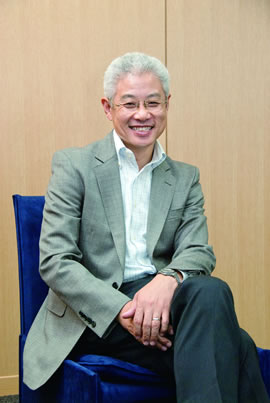Dr. Kang Cheng (1962-2016) Pioneer in High-resolution fMRI Technology
Kang Cheng, leader of the Research Resource Center (RRC) Support Unit for Functional Magnetic Resonance Imaging (fMRI) at the RIKEN Brain Science Institute (BSI), passed away on November 8, 2016 in Tokyo. He was 54. With deep sympathies for his family, friends, and colleagues, researchers worldwide are greatly saddened by his departure.
Cheng was a man of vision. A native of China, he passionately devoted more than two decades of his life to conduct research on how we see and recognize the world. Analyzing the visual association cortex in monkeys, he discovered “columnar structures” in 1992, in which cortical columns of neurons at the final stage of visual recognition respond to similar visual features. This work provided great insight into the neural coding of high dimensional visual features required for object recognition in the brain.
Cheng's work then extended to the human brain. At that time, the lack of technologies that could image columnar structures was a major challenge. In 2001, Cheng, together with his mentor Keiji Tanaka, leader of Cognitive Brain Mapping Team, developed a high-field fMRI technology to solve this problem and succeeded in visualizing 1-mm columnar structures in human visual cortex for the first time. Further improving this technology, Cheng continued efforts to depict a precise and complete functional brain map for visual features such as orientation and object color, and has since played a key role in advancing more recent innovations in high-resolution fMRI.
In RRC, Cheng collaborated extensively with other researchers at BSI. His technical and intellectual support were indispensable for many notable BSI studies, such as the neural basis of intuitively generating the best next move in a board game, analysis of infant-directed speech by adults, and understanding how humans learn social decision-making. These achievements reflected not only Cheng's intelligence but also his generosity and kindness. “Kang had a broad heart. He was always ready to help others and lend his support, showing great sympathy and understanding for other people”, said Keiji Tanaka, his mentor and closest collaborator.
At the time of his passing, Cheng was still on the journey toward understanding the mysteries of visual recognition. “…we have witnessed great progress in high-resolution fMRI studies over last few years”, he stated in a recent review article published in Neuroimage. “… [But] there is a long way to go before we can use high-resolution fMRI routinely for studying certain populations with developmental visual abnormalities, such as amblyopia and strabismus”.
Cheng's passing is a great loss for BSI and the global neuroscience community. He was a caring husband and father, and a compassionate mentor for the members of his research unit. That Cheng left us prematurely is a great tragedy. He was loved and will be missed. Like the beautiful photographs he took for his pleasure, we will continue to remember Kang Cheng in our collective memory, a man of great intelligence, curiosity, warmth, and generosity.

Dr. Kang Cheng